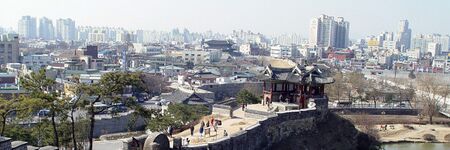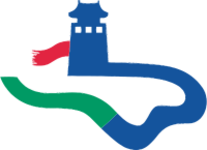Suwon City Korea: Difference between revisions
No edit summary |
No edit summary |
||
| Line 6: | Line 6: | ||
|established=1413 | |established=1413 | ||
|area=46.73 sq.mi | |area=46.73 sq.mi | ||
|elevation=1,909 ft | |||
|population=1241311 | |population=1241311 | ||
|website=46.73 sq mi) | |website=46.73 sq mi) | ||
Latest revision as of 16:56, July 17, 2022
- Members
Suwonis the capital and largest city of Gyeonggi-do, South Korea's most populous province which surrounds Seoul, the national capital. Suwon lies about 30 km (19 mi) south of Seoul. It is traditionally known as "The City of Filial Piety". With a population close to 1.3 million, it is larger than Ulsan, although it is not governed as a metropolitan city.
Activities

|
The mobile Edge Smart City Platform | |
Key Deliverables
| ||
Details
Suwon has existed in various forms throughout Korea's history, growing from a small settlement to become a major industrial and cultural center. It is the only remaining completely walled city in South Korea. The city walls are one of the more popular tourist destinations in Gyeonggi Province. Samsung Electronics R&D center and headquarters are in Suwon. The city is served by three motorways, the national railway network, and the Seoul Metropolitan Subway. Suwon is a major educational center, home to eleven universities.[3]
Suwon is home to several football, baseball, basketball and volleyball teams, including four-time K League champions and two-time AFC Champions League winner football club Suwon Samsung Bluewings[4] and 2021 Korean Series champions KT Wiz of the Korea Baseball Organization.
- History
In ancient tribal times, Suwon was known as Mosu-guk of Mahan confederacy. During the Proto–Three Kingdoms period era, however, the area comprising modern Suwon and Hwaseong City was called Maehol-gun.
In 757, under King Gyeongdeok of the Unified Silla, the name was changed to Suseong-gun. In 940 during the Goryeo dynasty changed again in to Suju. King Taejong of the Joseon dynasty renamed the city to Suwon in 1413.
In 1592, during the Imjin wars, Commander Yi Kwang attempted to launch his army toward the capital city, Seoul (at the time called Hanseong). The army was withdrawn, however, after news that the city had already been sacked reached the commander. As the army grew in size to 50,000 men with the accumulation of several volunteer forces, Yi Kwang and the irregular commanders reconsidered their aim to reclaim the capital, and led the combined forces north to Suwon.

